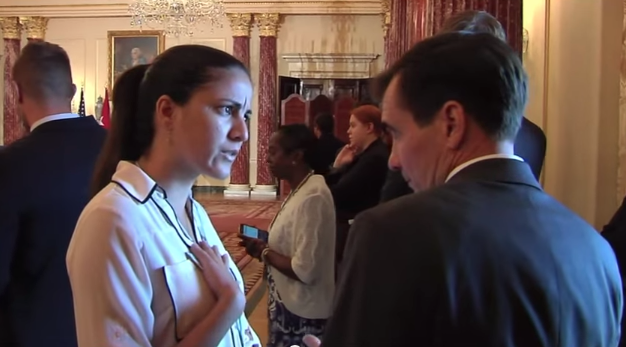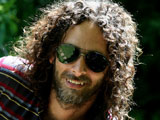Castro: Now Censoring Cubans in Washington DC’s Department of State
by Orlando Luis Pardo Lazo and translated by Alex Higson / August 3, 2015 / 1 Comment

Cuban activist Rosa María Payá and U.S. admiral John Kirby. Photo via Youtube.
Exiled Cuban activists face censorship at the opening of the Cuban embassy.
After 54 years of no diplomatic relations between Cuba and the United States, on July 20 at 10:.30 am the Cuban Embassy in Washington D.C. opened its doors.
Under the blazing sun, with temperatures exceeding 90 degrees Fahrenheit, more than 500 people gathered in the mansion at 2630 16th Street Northwest in the U.S. capital city. They were served an alcoholic stream of Cuba’s world-famous “mojito,” as well as a carnival of Cuban sandwiches (yes, that very same creole delicacy that became one of Cuba’s many exiles after so many decades of food shortages).

- Is it worth-while to focus on the last images and letters coming from the inside of the last living utopia on Earth? Is Cuba by now a contemporary country or just another old-fashioned delusion in the middle of Nowhere-America? A Cold-War Northtalgia maybe? Can we expect a young Rewwwolution.cu within that Ancien Régime still known as The Revolution? I would like to provoke more questions than answers.

- Orlando Luis Pardo Lazo was born in Havana City and still resides and resists there, working as a free-lance writer, photographer and blogger. He is the author of Boring Home (2009) and is the editor of the independent opinion and literary e-zine Voces.
A number of pro-Castro Americans stood out among the guests, including actors, journalists, businessmen, academics, politicians, former politicians, diplomats, and former diplomats. However, there was not a single leader or influential citizen from the exiled, anti-Castro Cuban community to be seen, despite this group numbering over two million people in the United States. Peaceful protests against this injustice were consequently held on the street outside. But really, this exclusive approach was to be expected, as that is exactly how Castroism has managed to keep on governing: through violence and non-dialogue.
However, the most alarming turn of events was to come a few hours later, at the press conference held that Monday afternoon by the U.S. Secretary of State, John Kerry, and Cuba’s Minister of Foreign Affairs, Bruno Rodríguez Parrilla, at the Department of State. As a journalist, I was able to attend on behalf of the Firmas Press agency, based in Miami, alongside Cuban activist and columnist Rosa María Payá. Payá is the daughter of the martyr Oswaldo Payá, winner of the European Parliament’s Sakharov Prize in 2002, whose extrajudicial killing in Cuba coincidentally took place three years previously on July 22.
As soon as we entered the room, we could feel the tension around us. Security agents surrounded our seats with menacing looks on their faces. As good Cuban citizens who have fallen victim to repression by State Security in our homeland, paranoia soon took hold. But it was not until I was taken aside by the security spokesman, John Kirby, that we realized what all the fuss was about. All that security was there for the two of us.
Despite holding the honorable rank of admiral, John Kirby had the dishonorable task of serving as a censor of free speech in the Land of the Free. And not only this, but he also had to carry out his role as though he were a puppet controlled by totalitarians.
Mr. Kirby went on to tell me that I was not permitted to ask the Cuban Minister any questions and, most importantly, that I was to inform my colleague Rosa María Payá that they were threatening to forcefully eject her from the room if she made the slightest attempt to participate.
This ridiculous behavior by the U.S. government towards two Cuban citizens, who are also permanent residents in the United States, can only be seen as part of the discrimination against pro-democracy Cubans, which has gradually taken root throughout Barack Obama‘s haggardly democratic administration.
This abuse of trust on a personal level, this lack of respect for our profession as freelance journalists, and this abuse of power exercised by a public servant paid for by U.S. taxpayers were also a means of intimidating us. The press conference was never going to be a truly open forum, to avoid causing the slightest discomfort to Rodríguez Parrilla. Indeed, Parrilla’s responses were not so much demagogic as despotic, insisting that any possible “political opening-up in Cuba” had already happened in the distant past of “January 1959,” when the Castroist Revolution seized absolute power through violence and abolished civilian life in our country.
Today’s democracies seem to shy away from democratizing their neighbors. But Castroism is now more confident than ever in being able to Castroize the entire continent. The future of open journalism in our hemisphere becomes more endangered with each day, as the influence of Cuba’s never-ending single-party system now seems to have infiltrated as far as the Department of State in Washington DC.





One Comment on "Castro: Now Censoring Cubans in Washington DC’s Department of State"
Has a complaint been lodged against Mr. Kirby with the State Department? It seems a formal investigation and possible censure of the admiral is in order.